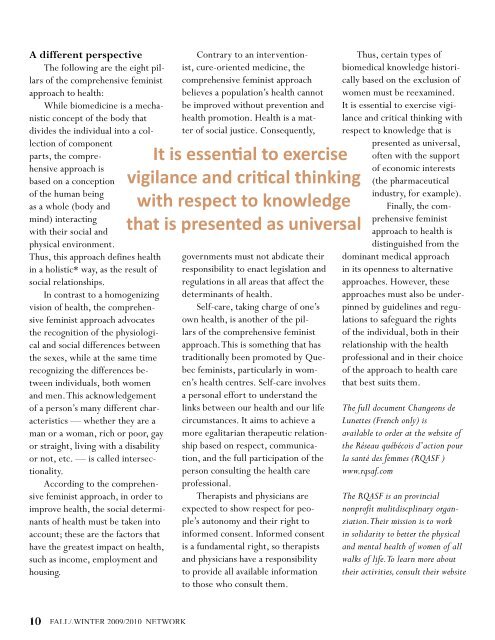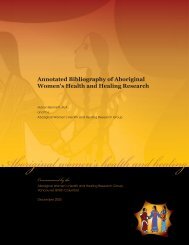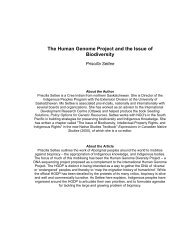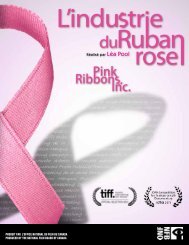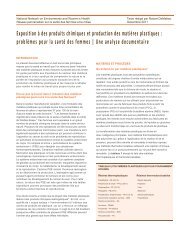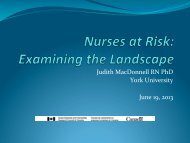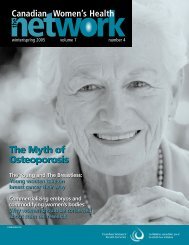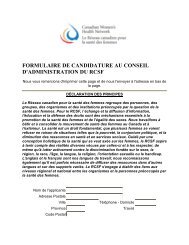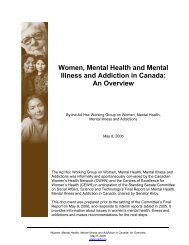Network 12-1.pdf - Canadian Women's Health Network
Network 12-1.pdf - Canadian Women's Health Network
Network 12-1.pdf - Canadian Women's Health Network
Create successful ePaper yourself
Turn your PDF publications into a flip-book with our unique Google optimized e-Paper software.
A different perspective<br />
The following are the eight pillars<br />
of the comprehensive feminist<br />
approach to health:<br />
While biomedicine is a mechanistic<br />
concept of the body that<br />
divides the individual into a collection<br />
of component<br />
parts, the comprehensive<br />
approach is<br />
based on a conception<br />
of the human being<br />
as a whole (body and<br />
mind) interacting<br />
with their social and<br />
physical environment.<br />
Thus, this approach defines health<br />
in a holistic* way, as the result of<br />
social relationships.<br />
In contrast to a homogenizing<br />
vision of health, the comprehensive<br />
feminist approach advocates<br />
the recognition of the physiological<br />
and social differences between<br />
the sexes, while at the same time<br />
recognizing the differences between<br />
individuals, both women<br />
and men. This acknowledgement<br />
of a person’s many different characteristics<br />
— whether they are a<br />
man or a woman, rich or poor, gay<br />
or straight, living with a disability<br />
or not, etc. — is called intersectionality.<br />
According to the comprehensive<br />
feminist approach, in order to<br />
improve health, the social determinants<br />
of health must be taken into<br />
account; these are the factors that<br />
have the greatest impact on health,<br />
such as income, employment and<br />
housing.<br />
Contrary to an interventionist,<br />
cure-oriented medicine, the<br />
comprehensive feminist approach<br />
believes a population’s health cannot<br />
be improved without prevention and<br />
health promotion. <strong>Health</strong> is a matter<br />
of social justice. Consequently,<br />
It is essenal to exercise<br />
vigilance and crical thinking<br />
with respect to knowledge<br />
that is presented as universal<br />
governments must not abdicate their<br />
responsibility to enact legislation and<br />
regulations in all areas that affect the<br />
determinants of health.<br />
Self-care, taking charge of one’s<br />
own health, is another of the pillars<br />
of the comprehensive feminist<br />
approach. This is something that has<br />
traditionally been promoted by Quebec<br />
feminists, particularly in women’s<br />
health centres. Self-care involves<br />
a personal effort to understand the<br />
links between our health and our life<br />
circumstances. It aims to achieve a<br />
more egalitarian therapeutic relationship<br />
based on respect, communication,<br />
and the full participation of the<br />
person consulting the health care<br />
professional.<br />
Therapists and physicians are<br />
expected to show respect for people’s<br />
autonomy and their right to<br />
informed consent. Informed consent<br />
is a fundamental right, so therapists<br />
and physicians have a responsibility<br />
to provide all available information<br />
to those who consult them.<br />
Thus, certain types of<br />
biomedical knowledge historically<br />
based on the exclusion of<br />
women must be reexamined.<br />
It is essential to exercise vigilance<br />
and critical thinking with<br />
respect to knowledge that is<br />
presented as universal,<br />
often with the support<br />
of economic interests<br />
(the pharmaceutical<br />
industry, for example).<br />
Finally, the comprehensive<br />
feminist<br />
approach to health is<br />
distinguished from the<br />
dominant medical approach<br />
in its openness to alternative<br />
approaches. However, these<br />
approaches must also be underpinned<br />
by guidelines and regulations<br />
to safeguard the rights<br />
of the individual, both in their<br />
relationship with the health<br />
professional and in their choice<br />
of the approach to health care<br />
that best suits them.<br />
The full document Changeons de<br />
Lunettes (French only) is<br />
available to order at the website of<br />
the Réseau québécois d’action pour<br />
la santé des femmes (RQASF )<br />
www.rqsaf.com<br />
The RQASF is an provincial<br />
nonprofit mulitdiscplinary organziation.<br />
Their mission is to work<br />
in solidarity to better the physical<br />
and mental health of women of all<br />
walks of life. To learn more about<br />
their activities, consult their website<br />
10 FALL/.WINTER 2009/2010 NETWORK


